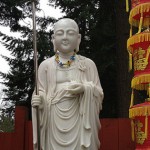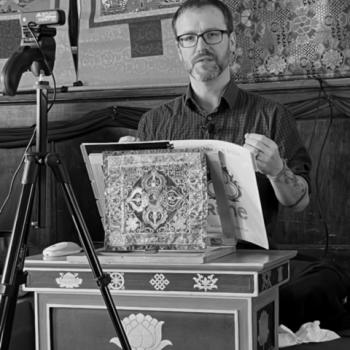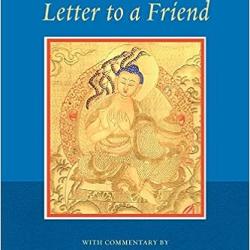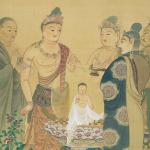This text “the 37 practices of a Bodhisattva” is a concise text written by a Tibetan teacher in the 14th century named Togme Zangpo who was a member of the Sakya lineage. It’s a summary of how we should behave as we are on the path to awakening. It’s a Tibetan Mahayana teaching.
21
Sensual pleasures are like salty water:
The deeper you drink, the thirstier you become.
Any object that you attach to,
Right away, let it go — this is the practice of a bodhisattva.
Worldly pleasures, those things we’re attached to that we constantly try to get more of, can never really satisfy us. Because our desires are unlimited, there can never really be enough.
This is called the poison of greed.
It’s our tendency toward selfishness. Our desire, attachment and yearning for happiness and satisfaction from external sources. It is our impulse to always want more. We want the objects of our desire, regardless of what those are, to bring us permanent satisfaction so we can feel complete. It helps to think about the accumulation of wealth. Money is made up of numbers and numbers never end, so we can chase that forever if we are obsessed with how much is in our bank account.
When we believe that our fulfillment is dependent on what we have, then we come to realize that we don’t really get the same satisfaction we were expecting. We always want more. Greed can affect our relationships, our jobs, and everything else.
Greed can also manifest as a lack of generosity.
Thinking about what we could have steals a lot of our happiness.
22
Whatever arises in experience is your own mind.
Mind itself is free of any conceptual limitations.
Know that and don’t generate
Subject-object fixations — this is the practice of a bodhisattva.
Everything we see is not as it really is, but through a filter of our perception. We have conceptual limitations that prevent us from seeing the whole picture and we fixate on duality, the difference between subject and object.
We have to come to understanding that we aren’t seeing things as they really are.
The western mystic Anais Nin said, “We don’t see things as they are. We see things as we are.”
This corresponds to the poison of delusion.
Delusion is our confusion and our misperception of reality. This is our lack of ability to understand the nature of things as they are—free of our labels and preconceptions. Under delusion we aren’t in harmony with the world around.
Without right perception, we don’t understand the way things are interdependent and impermanent. Because of this we are always looking outside ourselves for satisfaction. Because of our delusion we don’t understand our true nature.
The teachings of the Buddha tell us that our true nature is enlightened—that this will be realized if we can just see through our layers of ignorance.
23
When you come across something you enjoy,
Though beautiful to experience, like a summer rainbow,
Don’t take it as real.
Let go of attachment — this is the practice of a bodhisattva.
Everything is fleeting. This applies to both the things we like and the things we don’t like. Ikkyu called this world a fleeting dream, something we can’t hold on to. I think that’s important. If we think of the things we want as permanent, then we will suffer when we try to hold onto them. Nothing is permanent.
The description of the summer rainbow is important here. A rainbow is beautiful and it looks like something that really exists, but if we go try to grab it we won’t be able to. It has no solidity. It’s an illusion.
The best way to rid ourselves of attachment to these objects is to just understand that they aren’t real and permanent.
24
All forms of suffering are like dreaming that your child has died.
Taking confusion as real wears you out.
When you run into misfortune,
Look at it as confusion — this is the practice of a bodhisattva.
This is the reverse. We want to get rid of things. I like to think of that old cliche, “This too shall pass.” Good conditions and states of mind will come and go. Bad conditions and states of mind will come and go too. Sometimes when we’re in a bad state of mind we tend to cling to it, thinking it will last forever. But of course it won’t. Nothing will.
This corresponds to the poison of aversion.
Aversion is our anger, aversion toward things we don’t want, whether that be unpleasant people, circumstances, or even toward ourselves. It can manifest as anger, but also as impatience, ill-will, annoyance and hostility. We habitually resist and avoid feelings, circumstances, and people that we don’t like. We really want everything in our lives to be pleasant. This is nothing but a reinforcement of our illusion of duality and separation. Hatred puts us in a cycle of always finding something wrong.
When we are carrying aversion, our minds are frantic. We can’t be calm. We have a very easy time getting obsesses with whatever conflicts we are in. We can also have a conflict within, a hatred for our own feelings that we don’t like. With aversion we create enemies out of those around us and out of ourselves.
—————————————————————————–













